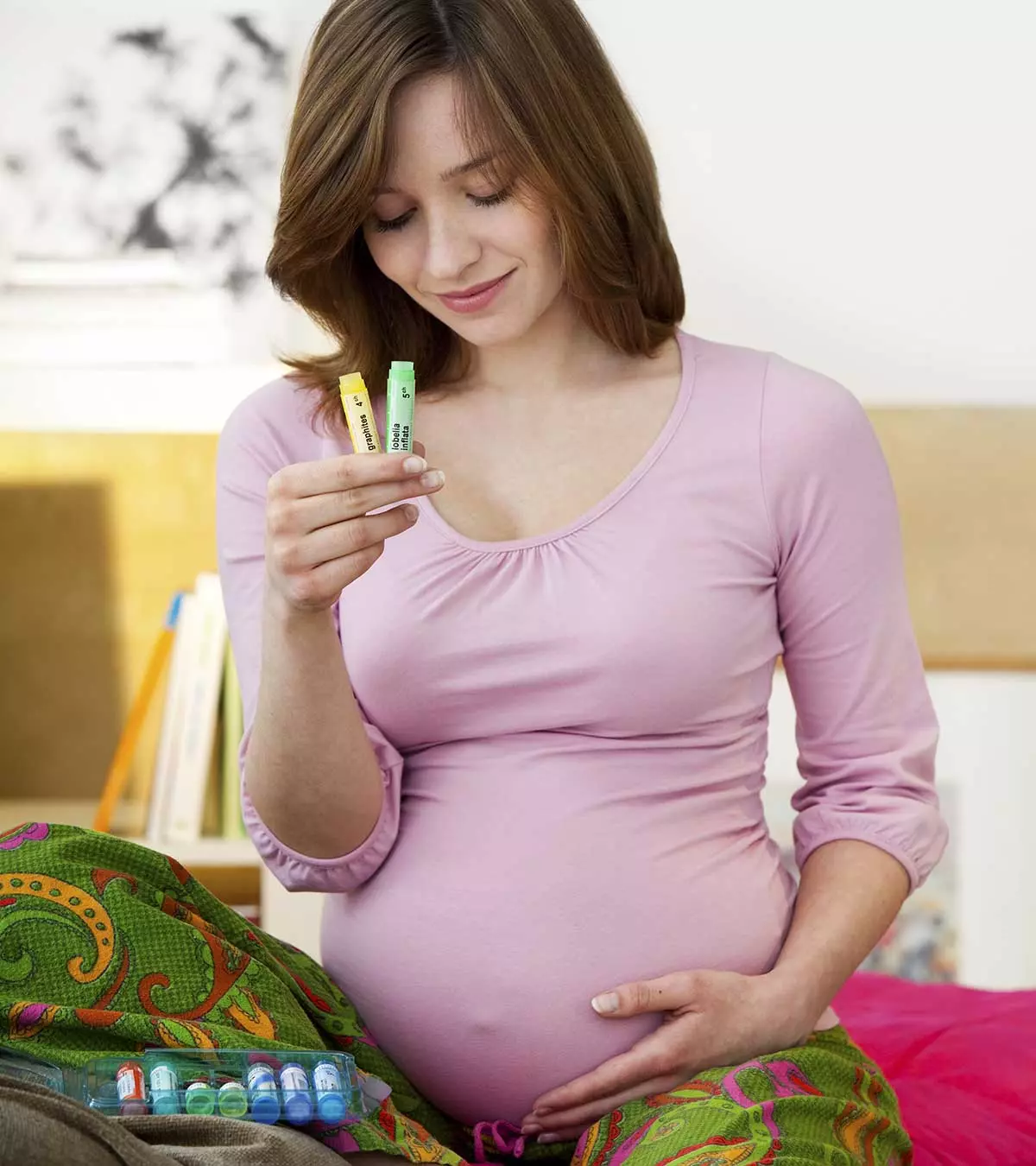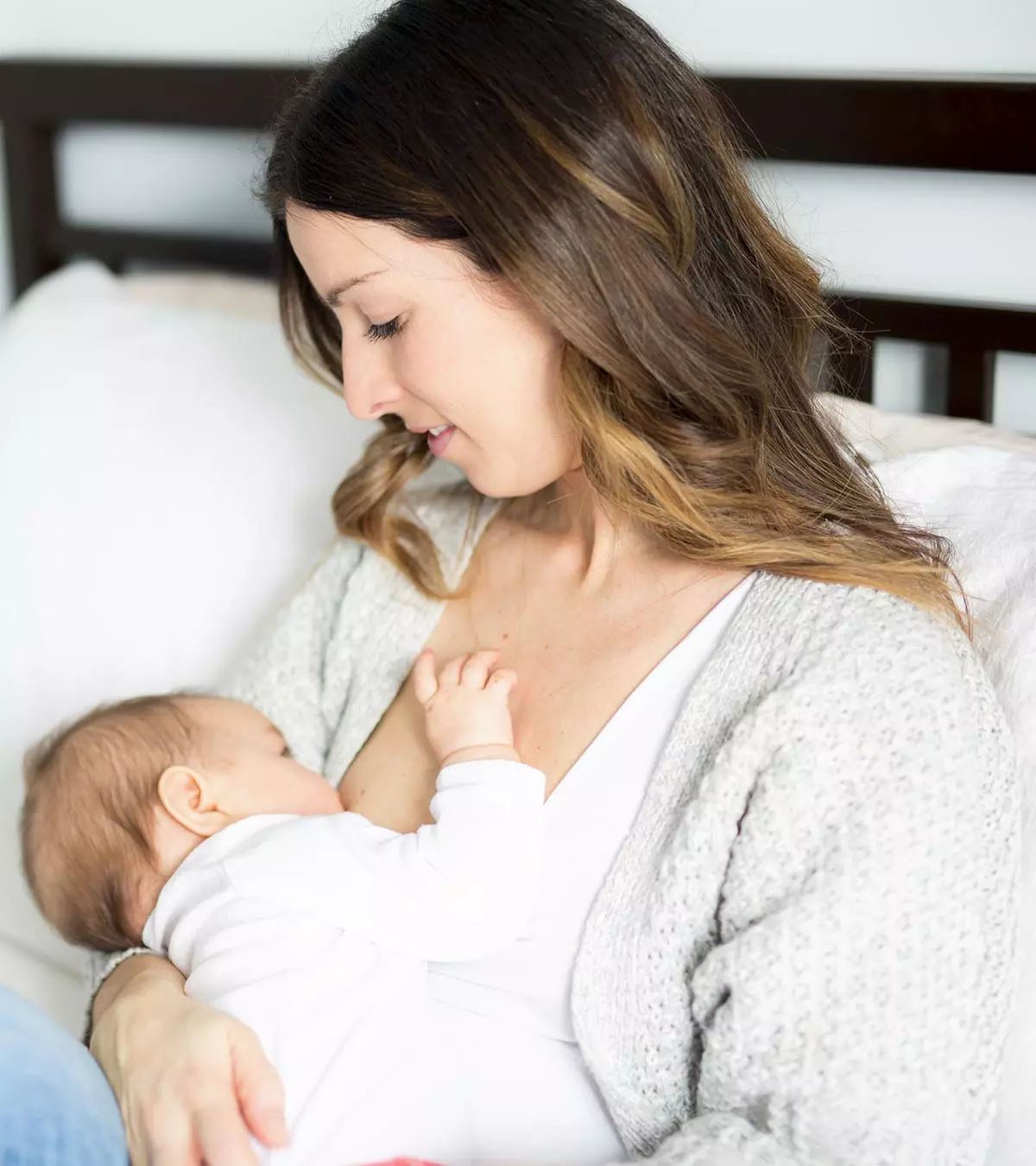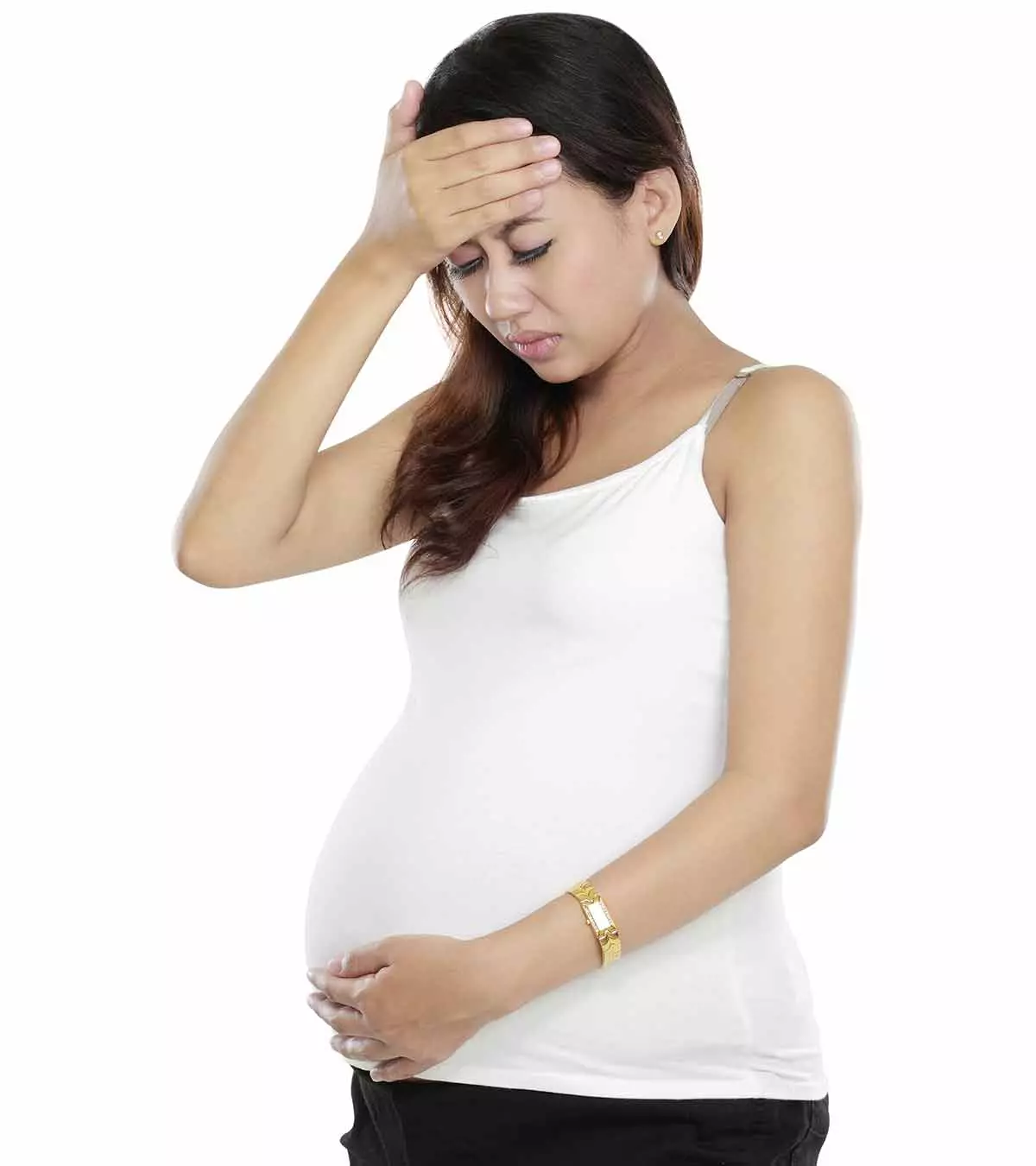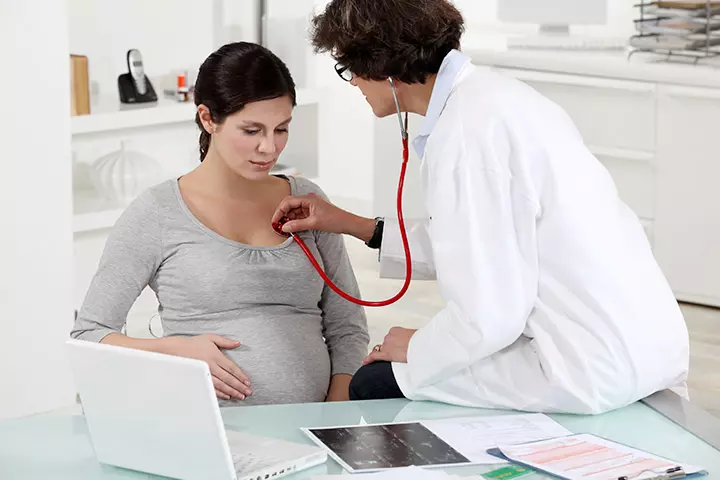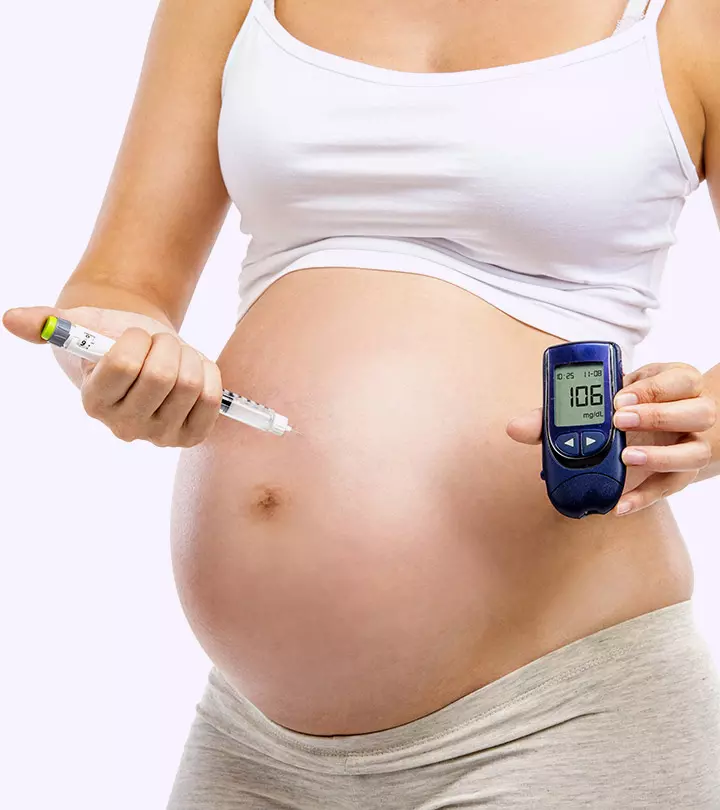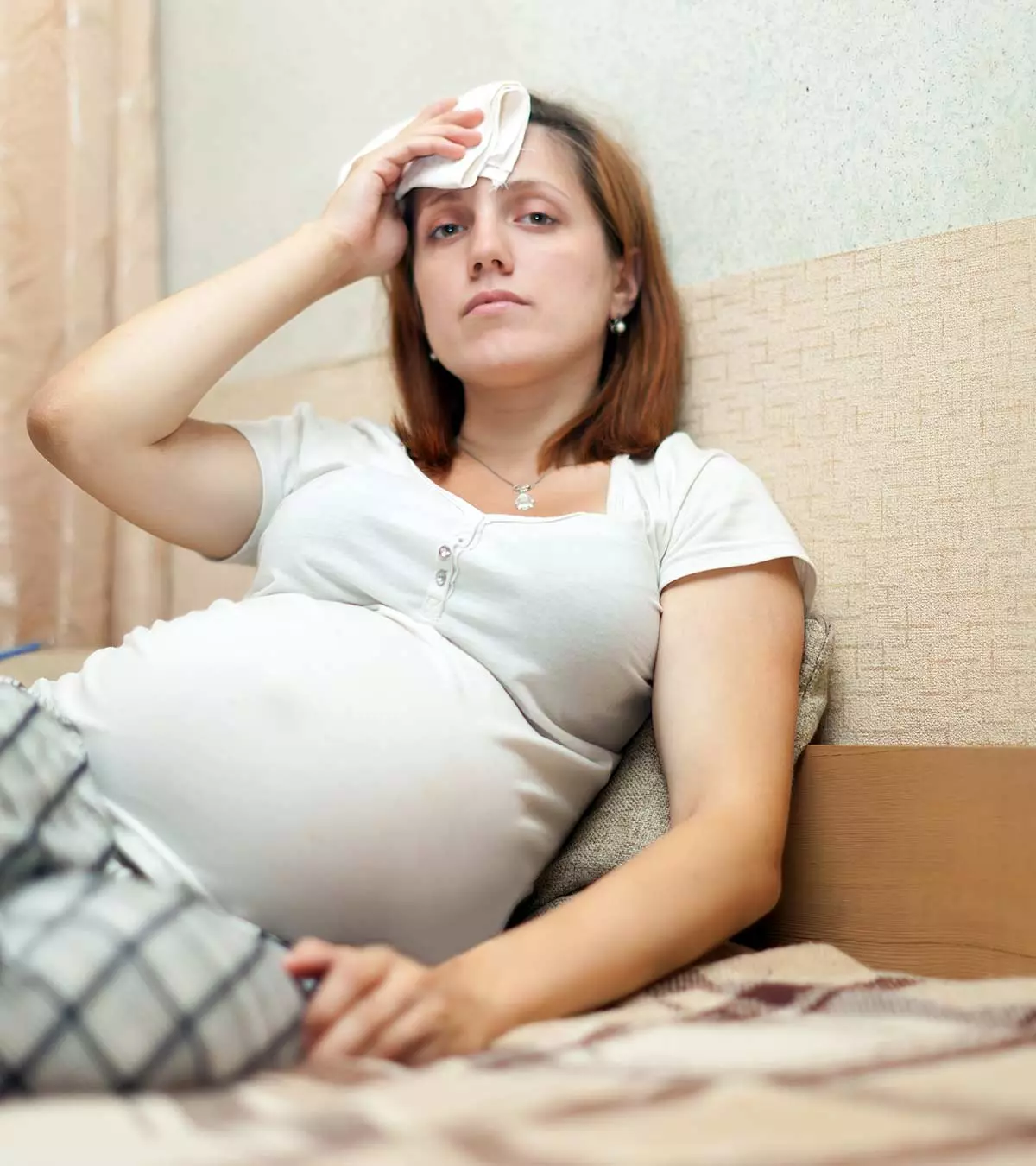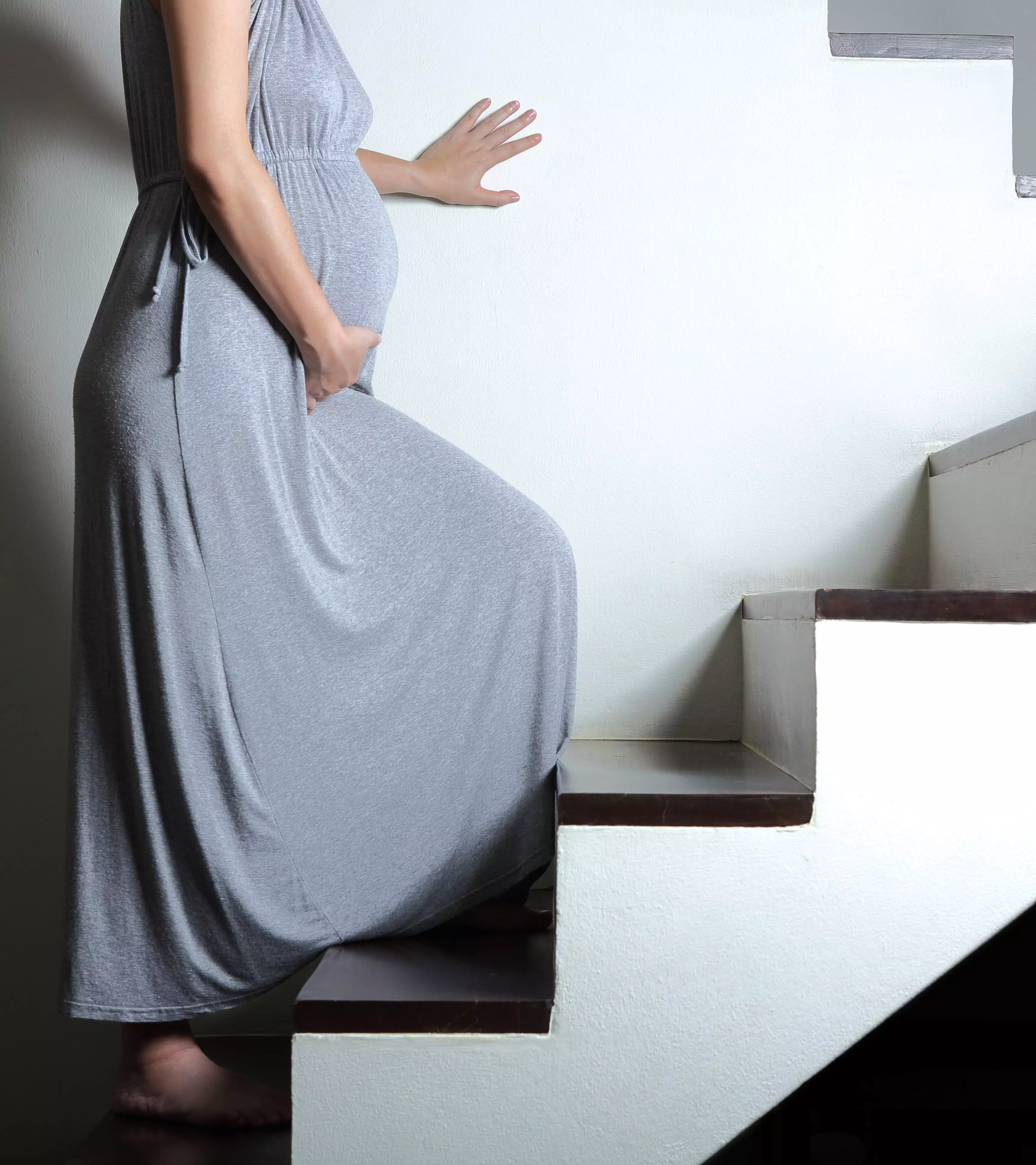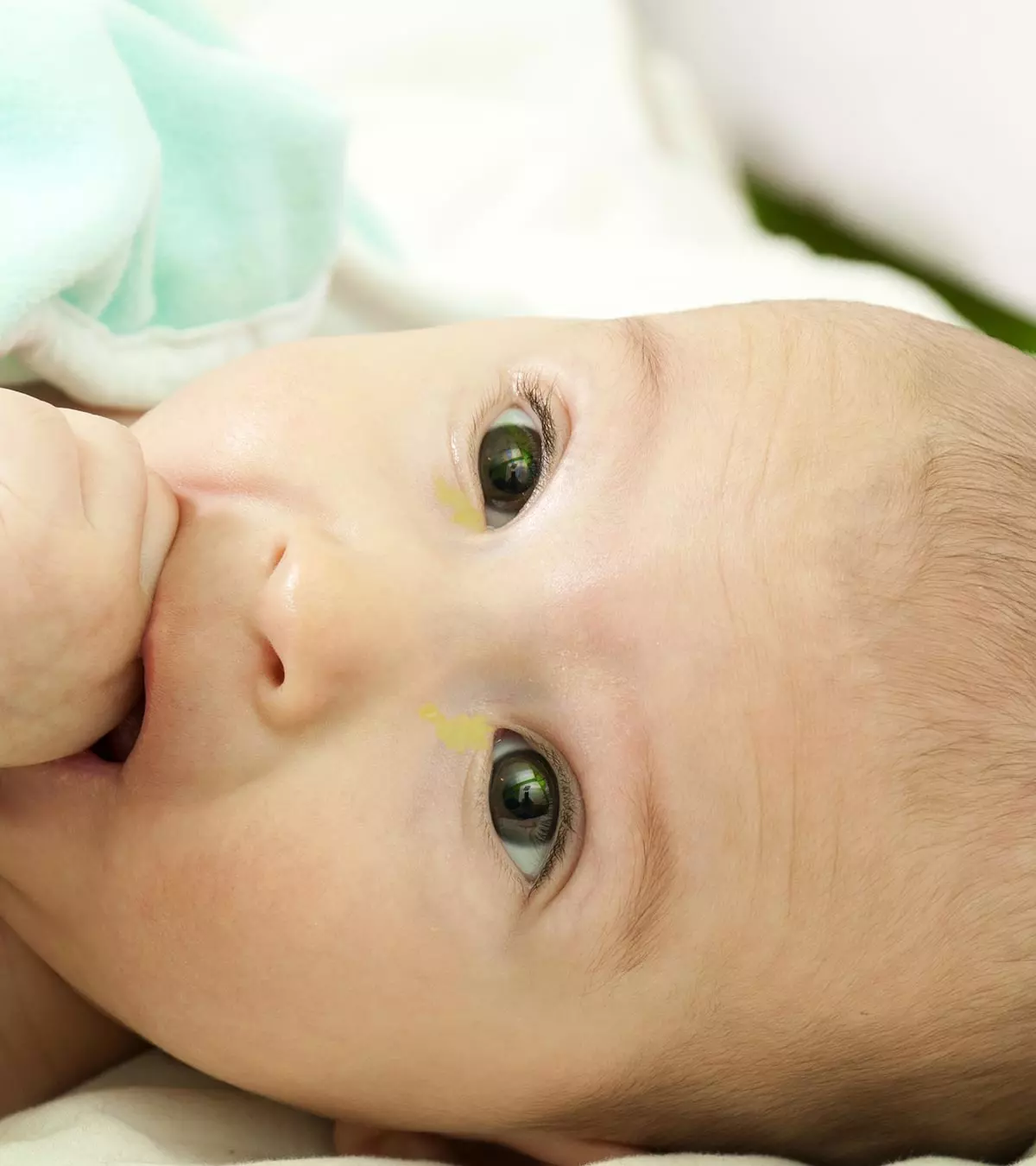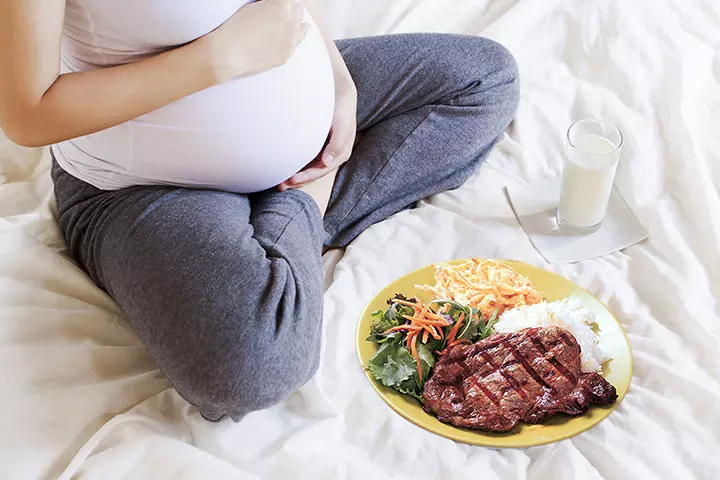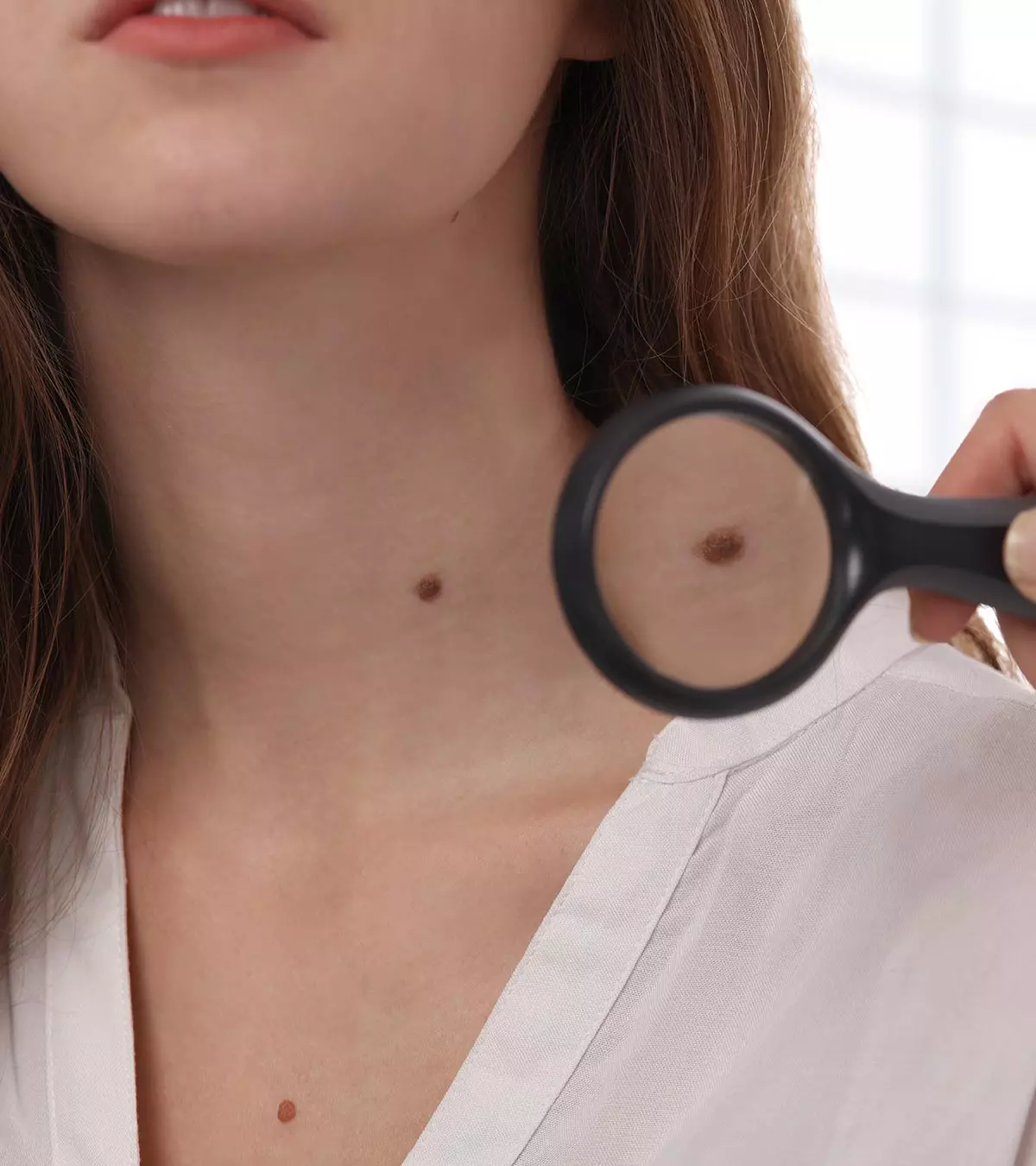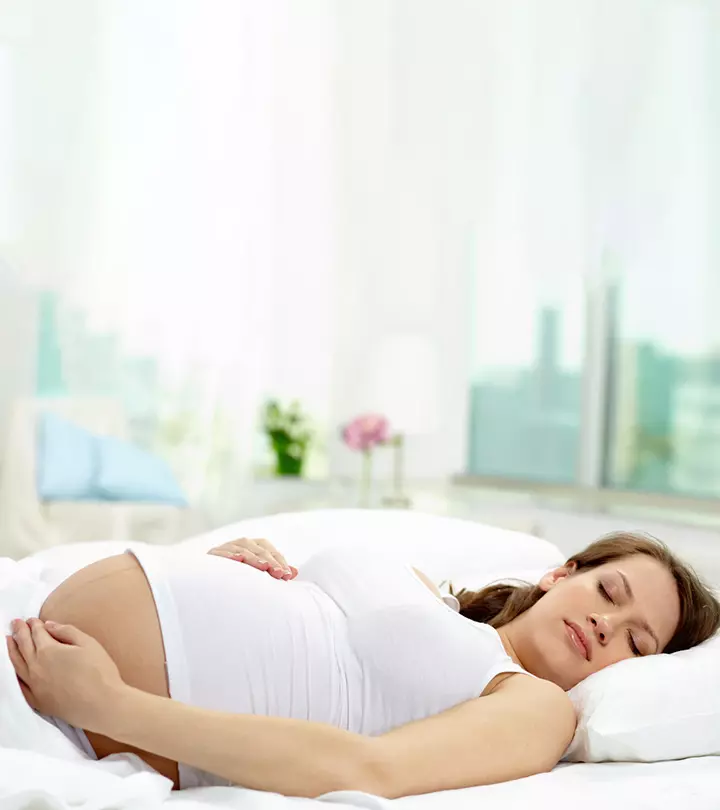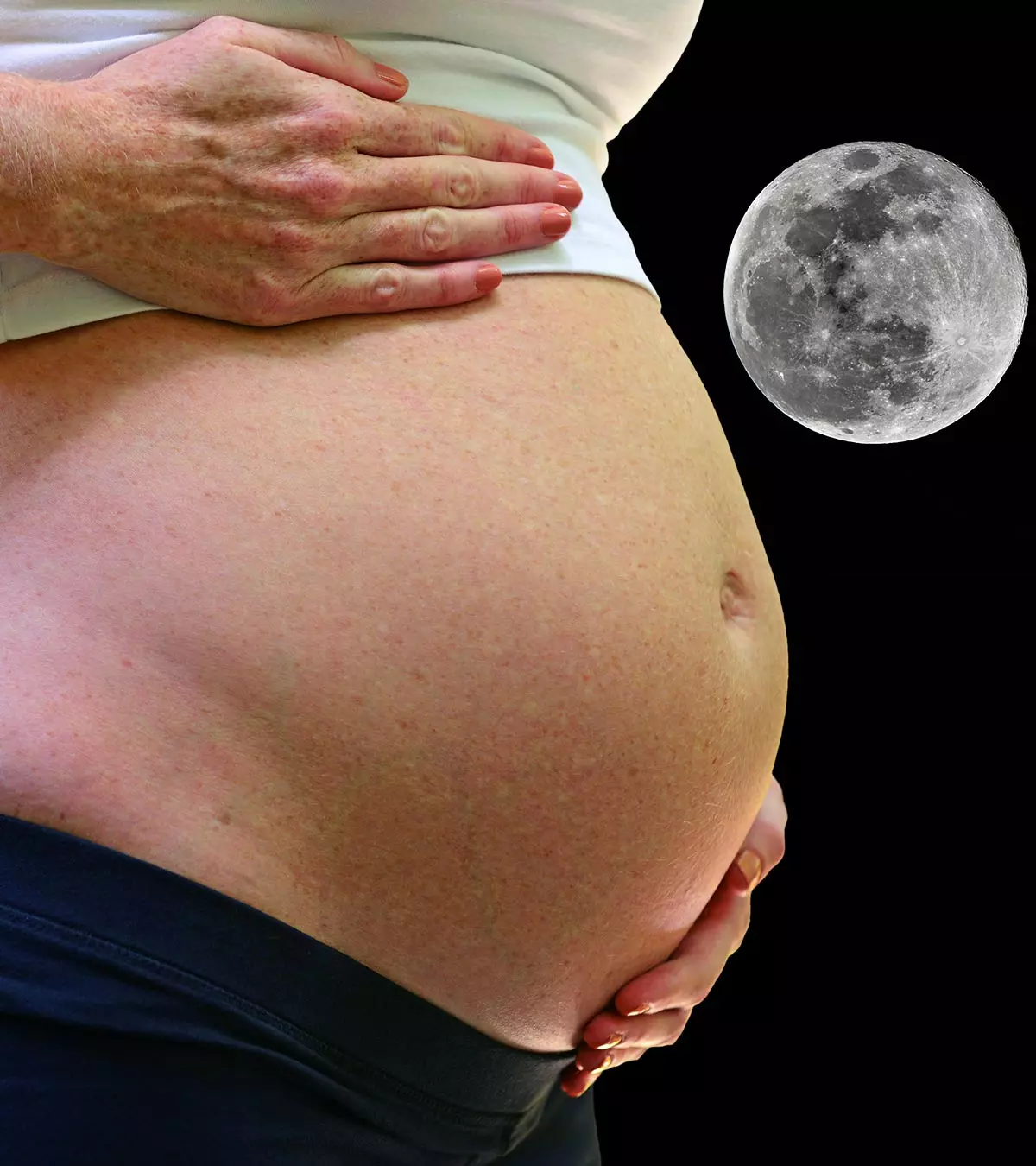
Image: Shutterstock
You may often come across various theories and questions that may confuse you during your pregnancy. For example, “Is an eclipse harmful during pregnancy?” is a common one. Eclipses occur when the sun is partially or fully blocked by the moon moving between it and the earth or when the moon is blocked out when the earth’s shadow moves over it.

However, people still debate about whether it negatively affects a pregnant woman. Pregnancy is a wonderful journey of fostering a new life inside you—and it comes with many responsibilities. You often try to do what’s best for the development of your fetus, which may stress you out, especially if you are pregnant for the first time. Moreover, the unending advice from near and dear ones can add to the confusion and anxiety.
Read this post to understand the myths and facts surrounding eclipses and pregnant women. We also provide some scientific facts wherever applicable.
Key Pointers
- An eclipse occurs when the moon or the earth blocks the sun due to their alignment.
- There is no scientific evidence to support the notion that an eclipse can harm a pregnancy.
- It is advised to avoid direct eye contact with the sun during an eclipse to prevent retinal damage or “eclipse blindness.”
- It is believed that avoiding food, drink, and cooking during an eclipse is necessary to prevent the growth of harmful microbes and bacteria.
What Is An Eclipse?
An eclipse is just as natural a phenomenon as is sunrise or sunset or even weather and climate change for that matter.
- An eclipse occurs when the sun, the moon and the earth, all three come in one single line.
- When the moon comes between the sun and the earth, it is called a solar eclipse.
- When the earth comes in between the sun and the moon, it is termed a lunar eclipse.
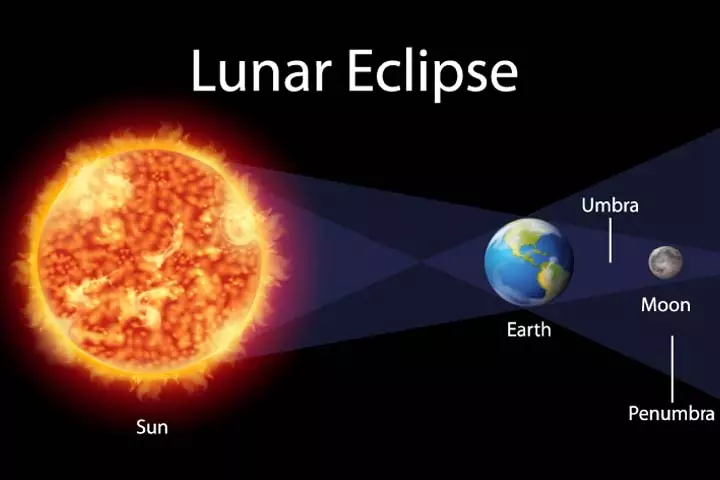
Eclipse During Pregnancy – Is It Really Bad?
Various cultures across the world have various takes on this.
- While some consider eclipse as a bad omen for pregnant women, there are others who don’t agree with it.
- Scientifically, there has been no evidence to prove that eclipse (both lunar and solar) poses a risk to maternal or fetal health during pregnancy.
, MD, PhD, a physician and medical writer from North Miami Beach, Florida, says, “There is no scientific evidence to suggest that a lunar eclipse can harm an unborn baby. It’s important to know that lunar eclipses do not emit any harmful radiation or other substances that could potentially harm an unborn baby. It is safe for pregnant women to observe a lunar eclipse, just as it is safe for anyone else.”
Myth Or Science?
Let’s have a look at whether eclipse can harm one only during pregnancy or if it can be harmful in general as well:
1. Don’t Look At The Sun And Stay Indoors:
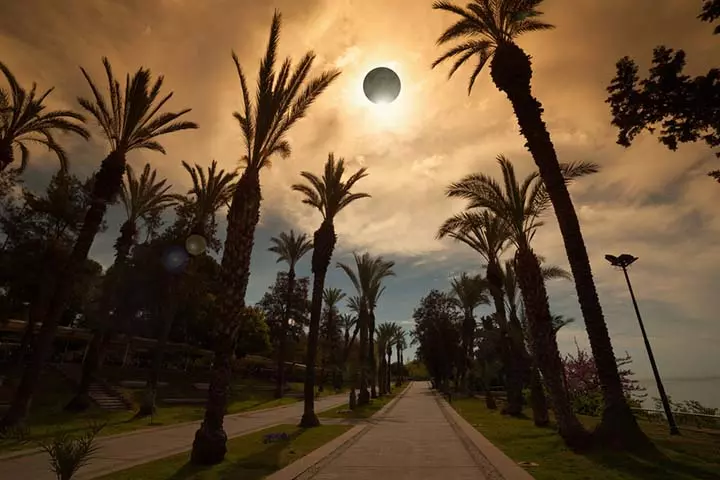
Yes, this is true, but this rule doesn’t apply only when you are pregnant. Rather, you should avoid looking at the sun directly during a solar eclipse even when you are not pregnant. The reason:
- Sun’s radiation can have harmful effects when looked at directly. You must take proper precautions if you are planning to watch it.
- Watching the eclipse with the naked eye can actually affect the exposure that your retina will have to the intense visible light of the sun.
- It can even result in retinal burns due to the damage done to the light-sensitive cone cells and rod.
- So whether you are pregnant or not, you should avoid staring at the sun directly during an eclipse as it can damage your eyes and develop what is known as ‘eclipse blindness’.
Dulzura en Julio, a Mexican father, shares his experience regarding the total lunar eclipse when his wife was pregnant. He writes, “My Mexican mother-in-law called my wife and told her not to go outside during the eclipse and to close all the windows so that no moonlight came into our home.
“Even though it’s probably just a Mexican myth passed down from generation to generation, I told my wife not to take any chances with our baby. We both stayed inside and I closed all the shutters and all the blinds like a good Mexican husband.” Later he researched the Mexican folktales associated with eclipse, including the Aztecs’ belief that “exposure of a pregnant woman to an eclipse will cause her infant to have a cleft lip or palate (i).”
 Research finds
Research finds2. Do Not Eat, Drink Or Cook During An Eclipse:
You must have heard a thousand different things about the eclipse from many people in your family. One such instruction is to avoid eating, drinking or cooking completely during an eclipse. Even this holds true. Here is how and why:
- It is a known fact that the sun rays are very important and are the reason for our survival.
- Without these rays, the earth might be just another place with lots of harmful microbes and germs. This is what happens during eclipses.
- Due to the sun being blocked, its rays too get blocked.
- As a result, there is a sudden drop in temperature.
- This temperature drop and missing sun rays cause microbes, bacteria and harmful germs to rise.
- This is said to affect food items and almost every perishable item for that matter.
- Hence it is advised to avoid eating, drinking or even cooking during an eclipse.
- The sun’s rays kill all the harmful bacteria and germs, which otherwise might be dangerous to humans.
- Hence proven this has a scientific logic.
Most people throw away all the food items prepared before the eclipse. This is just to avoid any kind of contamination or damage that the increased bacteria and microbes might have on food during an eclipse.
These were the major myths and beliefs regarding eclipse during pregnancy. It is highly advised that you visit your doctor and clarify every doubt that you might have. An eclipse is the most spectacular phenomenon of nature. It should not be looked upon as an omen.
Having said that, when your elders warn you against eclipses, realize that it is only for you and your baby’s safety. They might be warning you out of their beliefs and myths. However, you know that these myths are born out of science and have simply been given a new face in the name of culture, tradition and myths.
 Did you know?
Did you know?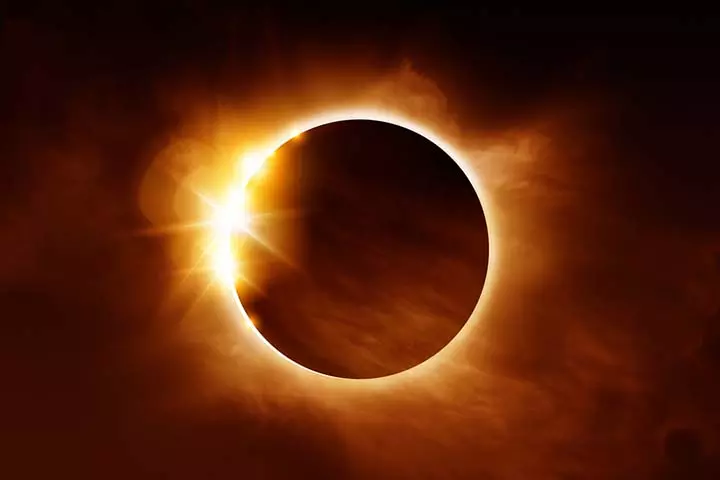
Precautions You Should Take During An Eclipse
It’s crucial to prioritize safety during an eclipse, whether pregnant or not. Here are essential guidelines (1) (2):
- Use special-purpose solar filters, such as eclipse glasses or hand-held solar viewers, to view the sun during partial phases.
- Check your solar filter for scratches or damage before use. Discard if damaged.
- Stand still and cover your eyes with your eclipse glasses or viewer before looking at the sun.
- Do not use unfiltered cameras, telescopes, binoculars, or optical devices.
- If you wear eyeglasses, keep them on and wear eclipse glasses over them.
Following these safety guidelines will help preserve your eye health and overall well-being while creating lasting memories of this extraordinary event.
Frequently Asked Questions
1. What to wear during an eclipse while pregnant?
Though there is no well-known suggestive clothing for pregnant women to wear during an eclipse, some cultural beliefs say that watching an eclipse while wearing a necklace could cause complications in pregnant women (3). However, this is a restrictive belief and is not proven in a large proportion of pregnant women.
2. Can pregnant ladies work during the lunar eclipse?
In several cultures, pregnant women are advised to stay indoors when pregnant. Experts suggest staying away from sharp objects to avoid accidents. Also, our ancestors had no electricity in the olden days, so they wanted pregnant women to stay away from chores during an eclipse (4).
While many cultures believe that eclipses are bad for pregnant women, there is no scientific evidence to back this claim. However, beliefs like remaining indoors, not staring directly at the eclipse, and avoiding eating may have more reasonable explanations. So, if you see an eclipse while pregnant or have doubts about the solar or lunar eclipse and pregnancy, don’t regard it as a bad omen. Instead, you may talk to your doctor and take the required precautions, as all myths are based on science and have merely been given a new face.
Illustration: Is An Eclipse Harmful To Pregnancy?
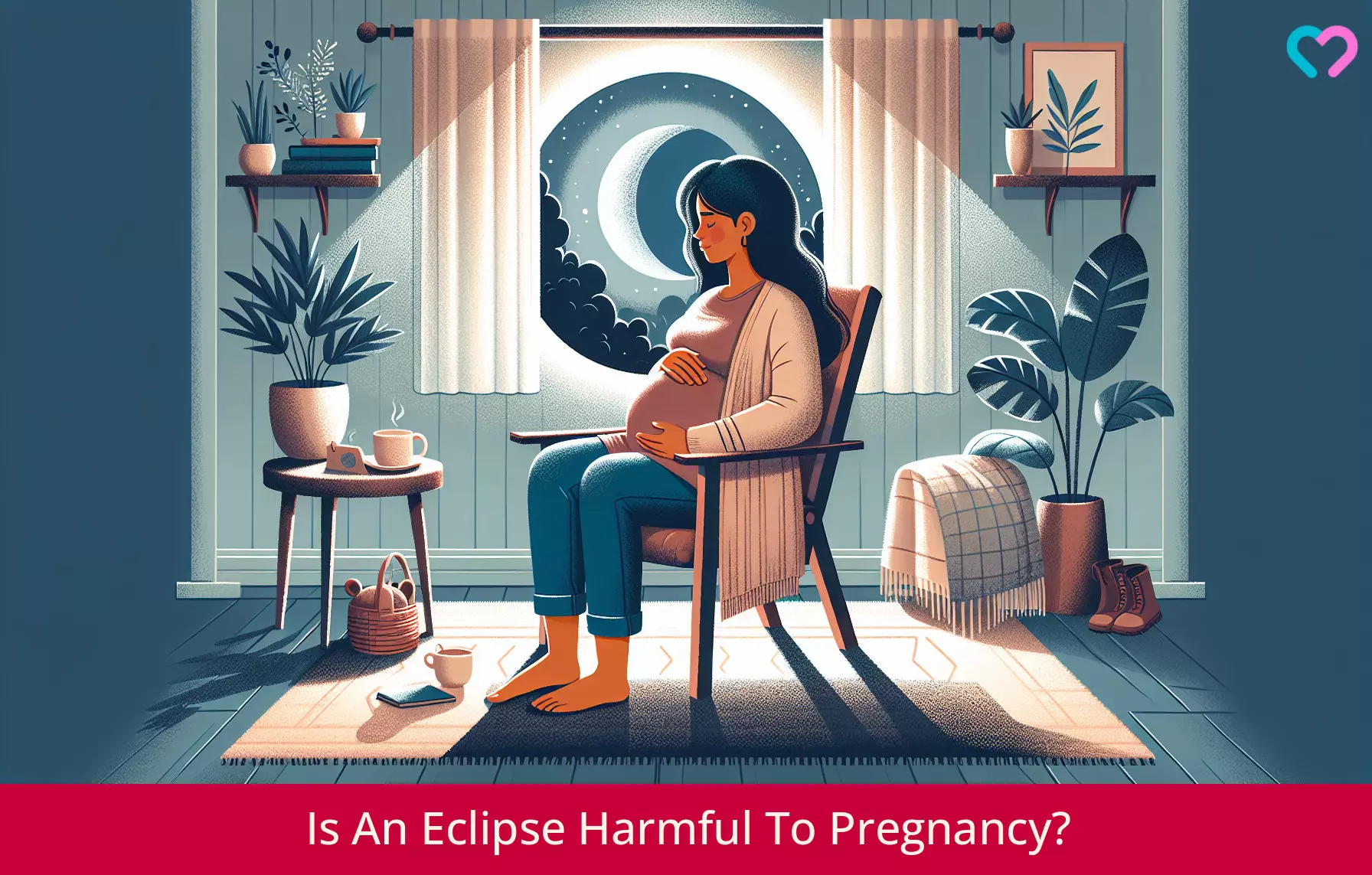
Image: Dall·E/MomJunction Design Team
Personal Experience: Source
MomJunction articles include first-hand experiences to provide you with better insights through real-life narratives. Here are the sources of personal accounts referenced in this article.
i. Mexican folk beliefs regarding pregnancy, eclipse, and other natural and supernatural things https://dulzuraenjulio.wordpress.com/2008/02/20/mexican-folk-beliefs-regarding-pregancy-eclipse-and-other-natural-and-supernatural-things/References
- Safety | Total Solar Eclipse; NASA
https://eclipse2017.nasa.gov/safety - Safety Tips for Viewing the Eclipse; University of Arkansas
https://news.uark.edu/articles/39288/safety-tips-for-viewing-the-eclipse - Kola M Owonikoko et al., (2017); Use of Safety Pin on Garments in Pregnancy: A Belief and Cultural Practice with Potential Harmful Effect
https://www.ncbi.nlm.nih.gov/pmc/articles/PMC5963120/ - Solar eclipse & pregnant women: Let’s debunk some myths & talk business
https://www.artofliving.org/in-en/culture/reads/solar-eclipse-and-pregnant-women - Saluja H et al., (2025); Study of myths and beliefs among the parents of a child with cleft lip and palate
https://www.ncbi.nlm.nih.gov/pmc/articles/PMC10235737/ - All the guidelines, do’s and don’ts you need to know during an Eclipse.
https://www.artofliving.org/in-en/culture/reads/do-donts-during-solar-eclipse
Community Experiences
Join the conversation and become a part of our nurturing community! Share your stories, experiences, and insights to connect with fellow parents.
Read full bio of Dr. Pamela Adhiambo Muga
- Dr. Naheed Ali has 18 years of experience in Holistic Health. He holds a Clinical Research Certification from The National Institutes of Health and a Lifestyle Medicine and Nutrition Certification from Harvard University.
 Dr. Naheed Ali has 18 years of experience in Holistic Health. He holds a Clinical Research Certification from The National Institutes of Health and a Lifestyle Medicine and Nutrition Certification from Harvard University.
Dr. Naheed Ali has 18 years of experience in Holistic Health. He holds a Clinical Research Certification from The National Institutes of Health and a Lifestyle Medicine and Nutrition Certification from Harvard University.
Read full bio of Reshmi Das
Read full bio of Dr. Ritika Shah
Read full bio of Aneesha Amonz







